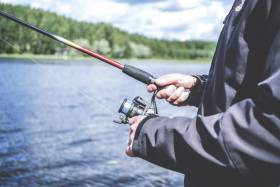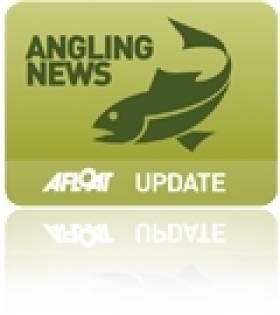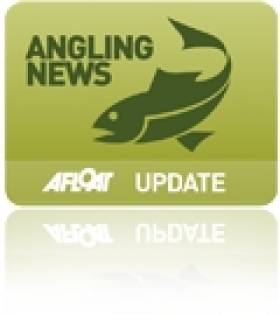Displaying items by tag: Youth Angling
Dormant Accounts Funding To Develop Youth Angling
#Angling - Inland Fisheries Ireland (IFI) has been awarded funding to develop angling among young people as part of the Dormant Account Action Plan 2018.
“Inland Fisheries Ireland was chosen as a recipient of two funding measures which will engage and support young and novice anglers in Ireland,” said Seán Kyne, Minister of State for Rural Affairs and Natural Resources, announcing the funding yesterday (Thursday 19 July).
“The funding will see the development of a new novice angling strategy, a scheme to support angling events for novice and youth anglers and the appointment of five Regional Outreach Co-ordinators”.
Novice Angling Strategy (€70,000)
This measure will see the development of a Novice/Youth Angling Strategy and a scheme to support events for disadvantaged groups, angling hubs and coaches to ensure a safe environment for youths and vulnerable adults. IFI will continue to support Angling for Youth Development Ireland (AFYDI) and the Angling Council of Ireland (ACI) who facilitate the formation of angling hubs nationally to increase access to angling through the provision of trained coaches and safe fishing.
Go Fishing - Novice Angling Initiative (€323,250)
This project will see the appointment of five regional Outreach Coordinators in the major urban areas who will work with Angling for Youth Development Ireland, the Angling Council of Ireland and other angling organisations to increase the numbers engaging in angling across the regions.
The Dormant Account Action Plan allocates €40 million in funding to 45 measures nationwide. Its funding supplements the support already allocated by IFI to youth angling via the National Strategy for Angling Development (NSAD). These five appointments, together with NSAD supported posts, will deliver national education and outreach and novice angling briefs.
The funding will also allow IFI to properly resource a novice angling strategy which will incorporate one of its existing youth angling programmes, the Dublin Angling Initiative, and the many other education and outreach initiatives which are taking place across the country. It will also reach out to and include angling and voluntary organisations nationwide.
“We are delighted to welcome this funding, which will support us in growing the numbers of novice and youth anglers in Ireland,” said IFI chief executive Dr Ciaran Byrne. “Recent socio-economic studies of recreational angling in Ireland reveal that of the 325,000 anglers in Ireland, 37% are over 55 years of age and 49% are in the 35-54 age bracket. We know however that 83% of primary school students we surveyed want to go fishing.
“There is a huge opportunity for us to engage the next generation around our natural fisheries resource and to introduce them to angling, a pastime they can enjoy at any age or ability with many health and wellbeing benefits. The Dormant Account funding will help us realise our ambitious objectives of growing participation in fishing nationally and secure the future of our resource as a result.
“We look forward to working closely with angling groups and communities across Ireland in the development of a new Youth Angling Strategy and the roll out of related novice angling initiatives.”
Minister Marvels at Young Anglers in Fly Fishing Worlds
#Angling - Minister of State Fergus O'Dowd gave some words of encouragement ahead of the World Youth Fly Fishing Championships taking place this week till 26 July in venues across Louth, Monaghan, Meath, Tyrone and Antrim.
The event will help to showcase the wonderful angling amenities on the island of Ireland, And with competitors all in the 14-18 age bracket, it will also promote the wonderful sport of recreational angling to young people.
Minister Fergus O'Dowd, who attended the launch of the event, encouraged the youthful competitors and marvelled at their ability to "take challenges in their stride at such a young age and compete wholeheartedly and sportingly".
The minister also acknowledged the important economic and social impact angling has on rural communities, bringing much needed revenue and jobs.
Inland Fisheries Ireland (IFI) chief Dr Ciaran Byrne added that the national fisheries body is "delighted to be the main sponsor of this prestigious event.
"IFI, through its sponsorship scheme, aims to promote youth angling but also ensure best practice, and in that regard IFI is providing the biosecurity measures for this competition."
Along with IFI, the Loughs Agency, DCAL, Fáilte Ireland and local businesses are supporting the great work of the organising committee under the guidance of the Leinster and Ulster councils of the Trout Angling Federation of Ireland. The competition is a cross-border initiative run under the regulation of FIPS Mouche.
#Angling - The World Youth Fly Fishing Championship is coming to Ireland's border region next month.
And as the Carrick Times reports, Carrickfergus in Co Antrim is looking forward to hosting part of the event at the Woodford Fly Fishery.
What's more, local lad and Woodford member Darren Crawford will be among the all-Ireland fly fishing squad vying for the international title at the event, co-sponsored by the Loughs Agency and Inland Fisheries Ireland.
Rivers and lakes hosting the competition are spread over the counties of Antrim, Louth, Monaghan, Meath and Tyrone.
In other inland fisheries news, Galway Bay FM reports that testing carried out after a fish kill in Loughrea Lake last month found no evidence of any bacterial or viral outbreak.
The cause of the incident that killed 100 perch in the lake are still unclear, though stresses connected with the spawning season are a distinct possibility.
































































